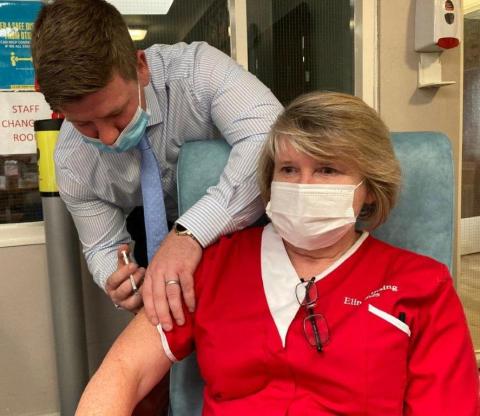This year’s winter vaccination programme gets under way

The winter vaccination programme, which includes the COVID-19 booster and flu vaccine, is now available to care home residents and staff. The vaccines help to prolong protection already received from initial COVID-19 vaccinations, while the flu vaccine is needed every year as the antibodies that protect you from flu decline over time, and flu strains change from year to year.
The Public Health Agency (PHA) announced at the beginning of September the plans for this year’s winter vaccination campaign, which will see flu and COVID-19 vaccines offered to over 1 million people in Northern Ireland.
Dr Joanne McClean, Director of Public Health at the PHA, said: “The programme which has already begun in care homes will be rolled out over the coming weeks and months to other eligible groups via GPs, community pharmacies, HSC Trusts and schools. I would urge everyone who falls into an eligible group to get ready for winter by taking up the offer of free vaccination when available.”
The majority of vaccines will be delivered via GPs and community pharmacies and each will have their own arrangements for inviting eligible groups and booking vaccine appointments. The programme will be completed over the period September to early December.
Many people who are eligible will be familiar with how they received their flu vaccine in the past and in most cases this will be the same route for the COVID-19 autumn booster.
People who are eligible for vaccination should receive an invite in due course from their GP surgery or they could enquire if the vaccines are available via a community pharmacy. Parents of children in primary one to year 12 should look out for the consent forms coming home in schoolbags, and sign and return them.
Each trust will also have their own arrangements for clinics, which are only for frontline HSC workers and a small number of other eligible groups, such as those under the age of 18 and pregnant women.
Dr McClean continued: “Flu activity levels have been extremely low globally over the last two winters, mainly due to COVID-19 prevention measures. As a result, a lower level of population immunity against flu is expected this year, plus the strains change continually. This coupled with COVID-19, which hasn’t gone away, could potentially result in a real health threat, particularly for vulnerable members of our community.
“Vaccines are the most effective way to prevent infectious diseases as they teach our immune system how to recognise and fight viruses. Being vaccinated against both viruses will not only help to protect you and those around you from flu and COVID-19, but will help protect everyone from a potentially devastating double threat this winter which could also impact on the services within our Health and Social Care system.”
Those eligible for the COVID-19 autumn booster will largely be offered a booster dose of either the Comirnaty bivalent (Pfizer/BioNTech) vaccine or Spikevax bivalent (Moderna) vaccine. Both vaccines are safe and very effective; they provide high levels of protection. A small number of people may be offered one of the original vaccines as their booster. This vaccine will also provide significant protection. The advice remains – the best vaccine to get is the one that is available and offered to you.
Some people may be offered the flu jab and COVID-19 booster vaccine at the same appointment. It is safe and effective to receive them in this way.
Eligible groups for flu vaccine in 2022 to 2023 are:
- Those aged 50 years and over (by 31 March 2023)
- Those aged 6 months to 2 years, and 16 to 49 years in clinical risk groups
- Pregnant women
- All preschool children aged 2 or over on 1 September 2022
- All primary and secondary (up to year 12) school children
- Those in long-stay residential care homes
- Carers
- Household contact of immunosuppressed individuals
- Frontline health and social care workers.
Eligible groups for COVID-19 vaccine in 2022 to 2023 are:
- All adults aged 50 and over (by 31 March 2023)
- Those aged 5 to 49 years in a clinical risk group
- Pregnant women
- Residents in a care home for older adults, and staff working in care homes for older adults
- Those aged 5 to 49 years who are household contacts of people with immunosuppression
- Those aged 16 to 49 years who are carers
- Frontline health and social care workers.
COVID-19 first, second and booster doses are still available to those who have not yet taken up the offer of vaccination for whatever reason.
For further information see www.nidirect.gov.uk/wintervaccines
